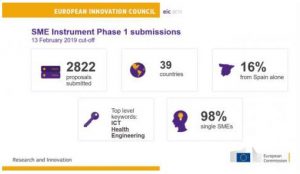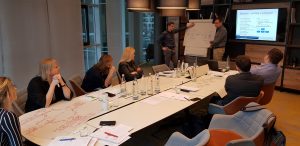RedKnight teaches Communication and Dissemination in Brussles

Another month, another successful Masterclass delivered by our team of experts!
This time, RedKnight went right into the heart of Europe to deliver a 2-day session in Brussels on the important of Impact in EC Funded Research & Innovation projects. The course, which took place between 18th and 19th February 2019, was a new seminar organised by our trusted associates at the European Academy, with the aim of teaching the importance of Communication Dissemination and Exploitation activities within European funded projects.
For this occasion, we sent our Project Manager, Matteo Radice, who was thrilled to share his experience - gathered managing the BreathSpec project - with the attendees. Upon his return to RedKnight HQ, Matteo said, "It was an amazing experience and I really enjoyed it. The class was very receptive and engaging and there were some very interesting discussions going on throughout both days. Also, having a representative from the European Commission provided incredible added value. I believe Communication and Dissemination activities deserve much more recognition amongst all research and innovation projects, as they are of utmost importance in letting European taxpayers know how the EC is investing in innovative ideas for the future." Talking more in depth about the course, Matteo went on saying, "The course is designed to give participants a thorough overview of what the EC is expecting from project participants and how to best deliver it; from the legal boundaries, to the most effective storytelling techniques and how to better engage with social media. It's packed of information and the participants loved it!"
For any news about this course and all the other RedKnight masterclasses, visit our website www.redknightconsultancy.co.uk.
2822 SMEs applied for funding under the SME Instrument phase 1
According to the latest report from the European Commission, 2822 proposals for the SME Instrument Phase 1 have been submitted before the latest cut-off date on 13 February 2019, to compete for a chance to win a lump sum funding of €50,000 to carry out a concept and feasibility study.
Overall, SMEs from 39 countries submitted proposals, with Spanish applicants sitting at the top of the charts with the biggest number of proposals for this batch (428), followed closely by Italian (384) and Swedish applicants (160).

The most popular areas of activity for applicants were ICT, health and engineering. Since 2018, the SME Instrument is part of the European Innovation Council (EIC) pilot. A novelty under the EIC pilot is that applications are fully bottom-up. Therefore as there are no longer set topics, proposals are classified according to keywords introduced by applicants. The top keywords introduced were, ICT, health and engineering and technology.
Stay tuned – results will come out in late March 2019.
Source: EASME
We at RedKnight wish to thank all the participants who entrusted us with their proposals and we wish all our clients the best of luck!! The next round of calls for this competitions will start from 7 May 2019. If you are interested in competing for the SME Instrument (Phase 1 or Phase 2), but you are not sure where to begin, contact RedKnight for a free consultancy.
A "flexible" Horizon Europe amid UK and Switzerland fear for exclusion
According to the European Commission research chief Jean-Eric Paquet, Horizon Europe will offer more "flexibility" to foreign countries that wish to join the new EU’s biggest ever R&D programme, which will run for seven years from 2021. The idea, said Jan -Eric Paquet, is to offer association membership that would allow former Third countries to participate in EU research under the same conditions as member states. This is indeed a proposal that already has stirred some interest from important partners (such as Canada) and it is expected to induce more foreign partners - at least between 20/30 - to seek association. However, although this is looks like a very promising development to the "open door" policy issued by the European Commission, internal disagreement and, a legal framework that still makes any EU programme too bureaucracy-intensive and, therefore, less appealing to major countries such as the US. On top of that, the most ambitious R&D programme ever, might risk losing two of the most influential countries.
As a matter of fact, Horizon Europe includes in its preliminary legal text a category of countries that may be barred from programmes designed to encourage innovation. The proposal still needs to be approved by member states yet, if the text is not amended, the whole programme is indeed destined to kick-off in 2021 amid serious uncertainties around the status both the UK and Switzerland will hold in the programme.
Swiss fears
With regards to the Alpine country, Swiss researchers have already experienced the effect of an exclusion from EU R&D funding when, in 2014, Switzerland was temporary relegated to third country status, with no access at all to important opportunities, such as the SME Instrument. The decision, due to an issue of migration quotas, caused the country to fall rapidly from a 3.9% to just 0.3% of all project coordination between 2014 -2016.
When it comes to the new programme, instead, Switzerland has been classified in category 4 of non-EU states. Strictly speaking, this new classification should not affect funding of Swiss research projects however, the heads of Switzerland’s two Federal Institutes of Technology, the Swiss Federal Institute of Technology in Zurich (ETHZ) and and the Swiss Federal Institute of Technology in Lausanne (EPFL) have recently voiced their concerns that funding restrictions could apply anyway, unless a political settlement between Swiss and EU politicians is reached.
UK Research between a "no deal" and pledges to "fully associate"
If talks between Swiss and the EU politicians have been going on since 2014 to reach a political agreement that might safeguard the “cake-and-eat-it” model granted to Switzerland, Britain’s research institutions have been trying to fill the recently increased political gap by engaging in alliances and agreements with other European counterparts. the idea behind this diplomatic effort is that “If the UK is left out of any part of Horizon Europe, it makes the programme less appealing [and] it lowers the level of competition, and probably lowers the value of the grant.” (Jessica Cole, head of policy at the Russell Group). For as bold as this statement can appear, it cannot be denied that in the much feared event of a no-deal Brexit, the new Horizon Europe will lose a net contributor that currently weights for the 14.3% of the total funding awarded by H2020 to date (€5.1bn) and counts the highest number of successful projects. These are all things that are very well taken into consideration in Europe as well and, although “A lot of people are thinking that ERC grants would become easier to win without the involvement of Cambridge and Oxford, [...] we need to defend the continent against the big money being spent on research in the US, Japan and China. We need our strongest team, so we should find a way to keep UK in the game.” (Olivier Küttel, EPFL head of European public affairs).
RedKnight Masterclass goes to Berlin

Berlin hosted the first leg of a whole new season of training which we forecast being even more successful than the last one! On 28th and 29th January 2019, RedKnight Director Dayne Hodgson travelled to the German capital city to deliver the company’s first Research and Innovation Proposal Development Masterclass of the year.
The two day training event, facilitated by European Academy, was attended by delegates from Finland and Lithuania and, as always, it made for a very interesting session.
Following his return to RedKnight HQ, Dayne said, “It was a fantastic couple of days discussing how our attendees can use our expertise and knowledge to enhance their own Horizon 2020 proposals. The group were very engaging, which prompted some fascinating discussions on the current R&D landscape across Europe”.
Innovate Uk tackles productivity problems in industry with a £4m competition
Next 25 February 2019, Innovate UK will launch a 2-phase competition to help National business solving business productivity problems and improving UK industry competitiveness.
Thanks to a partnership between Innovate UK, the National Physical Laboratory, the National Measurement Laboratory at LGC, the National Engineering Laboratory and the Science and Technology Facilities Council, up to £4 million will be made available to work with leading scientists and research facilities to explore why a certain percentage defect rate is occurring within an existing production process.
In the first stage of the competition, which will close at midday on 20 March 2019, UK-based organisations of any size should connect with potential partners to agree on an approach to a problem and work together to develop an expression of interest, that shall address:
• the measurement or analysis of some quantities or properties of an existing process, product or service
• Innovative solutions to problems that are not solvable by simple ‘off the shelf’ methods or techniques
Upon successful completion of Phase 1, eligible candidates will have access to Phase 2 (opening date and deadlines TBC), which will offer grant funding to total eligible project costs up to £300,000.
Source: InnovateUK
If you wish to find out whether your business can be eligible or even if you just would like to find out more, please do not hesitate to contact us at [email protected]
